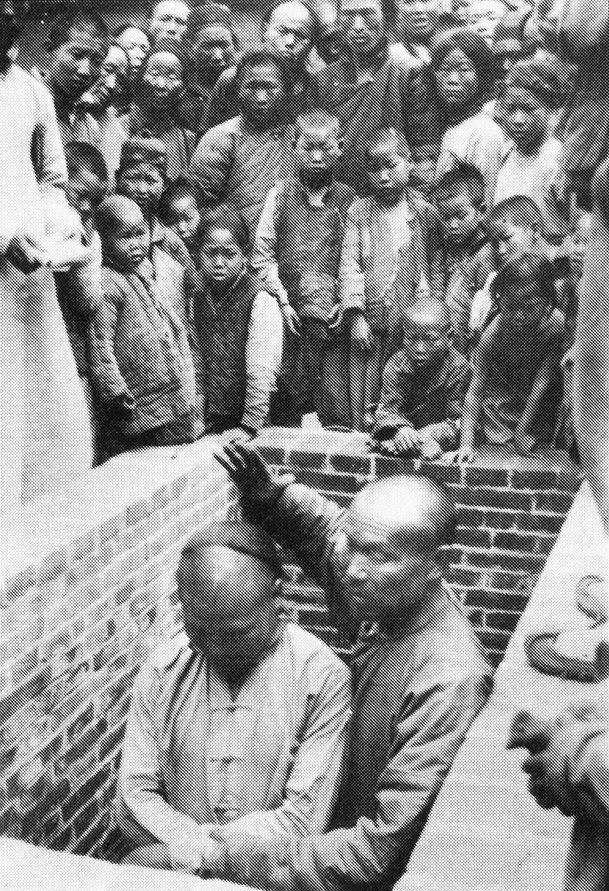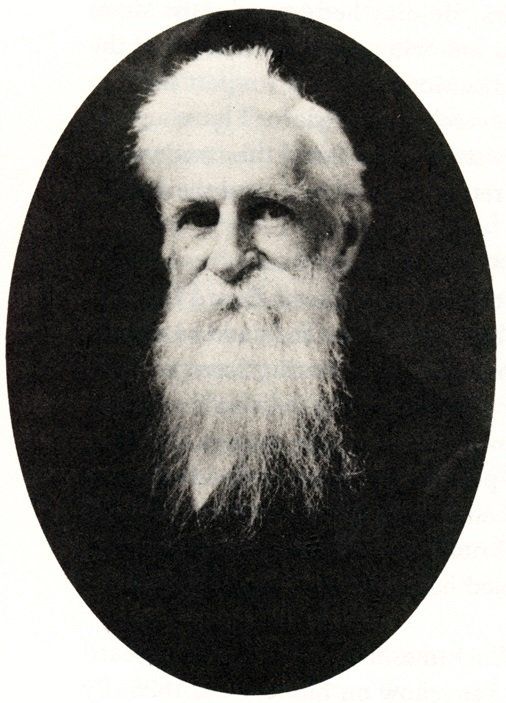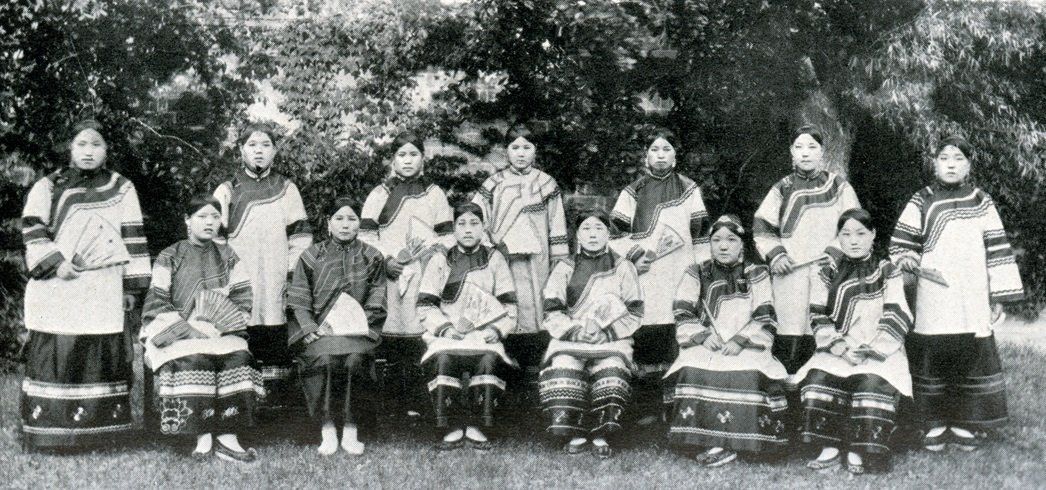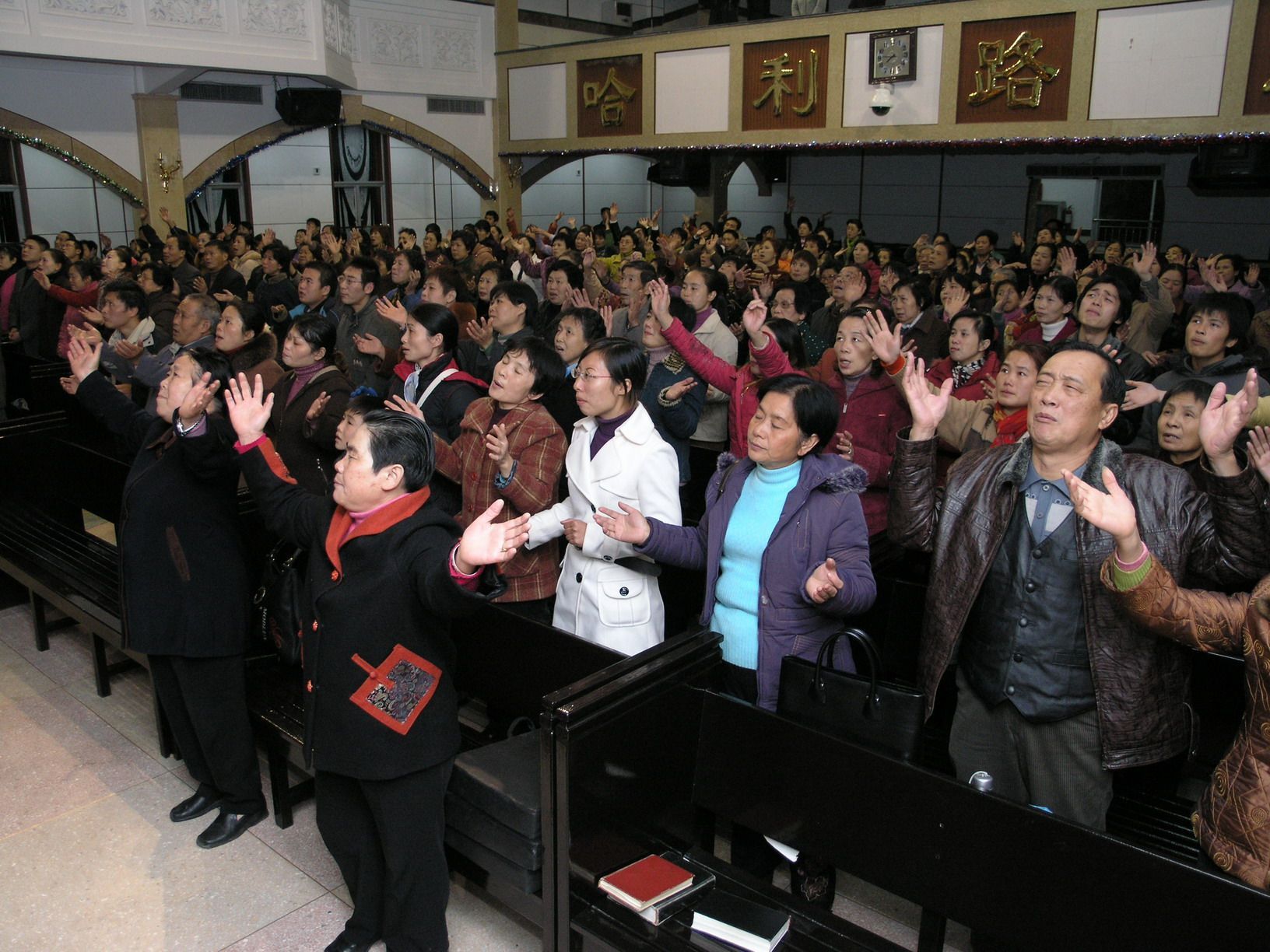1910s

Lottie Moon's co-worker Li Shouding baptizing new believers at Pingdu in 1910.
The Church in Shandong in the decade from 1910 to 1919 experienced strong growth, as the Holy Spirit transformed the lives of many people who consecrated their lives to Him.
The decade also brought terrible hardship to the people of Shandong, mostly due to the invasion of the Japanese military, who coveted the province because of its abundant natural resources and string of seaports. The invaders were undisciplined and brutal. They looted the towns and villages they passed through, and countless women and girls were raped by the treacherous soldiers. As the Japanese inflicted untold misery on the people of Shandong and elsewhere in China, they created a deep anti-Japan resentment that lingers to the present day.
The key city of Qingdao had been a German colony since 1897 (the only German colony anywhere in Asia), but in August 1914 the Japanese demanded the unconditional surrender of the city. When the Germans refused to oblige, the Japanese moved tens of thousands of soldiers and heavy artillery into areas surrounding the city. Some accounts say the Germans were outnumbered 15:1 (60,000 Japanese troops to 4,000 Germans).
A Great Missionary goes Home

Jesse Hartwell, who served more than 50 years in Shandong.
In 1861 the Southern Baptist missionary Jesse Hartwell was one of the first foreigners to reside in Shandong Province. At a time when a large percentage of his fellow workers died or left the field within their first year of service, Hartwell battled on faithfully, enduring numerous hardships and heartaches along the way.
Hartwell was born in South Carolina in 1835, after his father had prayed fervently for a son he could dedicate to the Lord as a missionary. On the very first Sunday he spent in Shandong, after Hartwell preached on the streets of Penglai, "the Holy Spirit sent the arrow of conviction into a man's heart. He afterwards gave his heart to the Lord."1
Because of a family illness, Hartwell returned to the United States in 1875, where he spent the next 14 years working among the Chinese in San Francisco. He led many of them to Christ, establishing the first Chinese Baptist church in America.
After returning to China, Hartwell led the mission and church in Penglai, and was a close associate of Lottie Moon for many years. He later became a beloved seminary teacher, and lecturing occupied him until his homeward call to heaven.
In 1897 Hartwell fell gravely ill, and his life was in the balance for months. Doctors said his days were numbered and that it was unlikely he would survive. The missionary felt his time had not yet come to depart, however, and set himself to pray earnestly. One afternoon he sat up in bed and told his family and fellow missionaries that God had revealed to him that he would live another 15 years.
He later fell sick again, but from the time God spoke to him, Hartwell never wavered in his conviction that he would live until 1912, and he didn't hesitate to tell physicians and any other interested person what God had shown him.
The end of 1911 arrived with Jesse Hartwell seemingly on his death bed, but the Lord intervened. When his life finally expired at Yantai on January 3, 1912, Hartwell had spent 53 years of his life in the Lord's service among the Chinese. One memorial summarized some of the ways God had used this humble man:
"It was he who baptized the first man in Shandong Province, which now numbers its native Christians by the thousands.
It was he who baptized the first woman in Shandong.
It was he who organized the first Protestant church in China, north of Shanghai.
It was he who organized the first Chinese Baptist church in America."2
God Heals Old Liu
In the spring of 1915, an 80-year-old Christian man named Liu received an unexpected blessing from God. Liu, from Gaomi City in eastern Shandong, became blind at the age of 70 when he learned that his wife and only son had suddenly died. As Liu mourned their deaths, his grief was so deep that the blood vessels in his eyes burst, causing him to lose his sight.
Despite his blindness, the old man didn't give up his faith and regularly attended church meetings despite his handicap. One Sunday, as he felt his way along the road toward the church, a heathen neighbor, seeing the old man stumble among the mounds of a graveyard on the side of the road, derided him: "How come your God is unable to make a blind man to see? Can He not see you? Is He not strong? Why don't you call on your foreign Jesus for help? Go and die, old man! Go and die like a dog!"3
The severe mocking failed to shake Liu's faith, and he boldly told his tormentor, "The true and Living God can help me, and from now on I shall trust Him, and in faith I am going to ask Him to heal my eyes!"4
That day Old Liu surrendered himself fully to the grace and power of God. He meditated on the promises of the Bible and claimed them by faith. Just a few days later his eyes were supernaturally healed! He did not even need to use glasses, and the mockery of his wicked neighbor was rebuked.
When a blind evangelist heard about Liu's healing, he was struck with conviction that he should not accept his own condition as a natural consequence of growing old. The evangelist gathered a small group of intercessors around him, and they regularly prayed together for the restoration of the man's sight. After a year the evangelist's sight was restored, and he also had no need for glasses.
A Demon-Possessed Grandmother
When the gospel was first declared to villagers in eastern Shandong, a teenage boy named Li was converted to Christ, and soon began attending the mission school at Qingdao. Li proved to be a tremendous witness for the Lord, and he won many of his friends and family members to the faith. In all, 12 people had surrendered their lives to Jesus through the young man's ministry.
One family member who steadfastly refused to believe, however, was Li's aged grandmother. She was the matriarch of the clan, and had grown very upset that the ancestral spirits were being disturbed by the conversion of so many of her family members to Christianity.
One day during the school holidays, Li returned to his home village. While he was leading family worship, his grandmother suddenly became violently ill. As the old woman trembled uncontrollably,
"She clutched the air, striking at unseen beings, and gnashed her teeth.... Her fingers were so firmly clenched together that one of her grandsons, who was called in to force her hands apart, was unable to do so.... For some time she talked, though not understandingly, breaking out at the close in this clear sentence: 'I am a herd of swine demons."5
Li had been accompanied home by a classmate named Wan, who was a mature Christian. The duo watched as the grandmother's body became as stiff as a board and horrific sounds emanated from her mouth, as though hell itself had laid claim to her body.
Wan led the other startled Christians in prayer, and he read aloud from the gospel accounts of Jesus casting demons out of tormented people. The believers then knelt together and prayed for half an hour, before calling on the unclean spirits to come out of the woman in Jesus' Name.
As a result of their prayer, the grandmother was thrown back on to her bed, and the life appeared to have drained from her limbs. After considerable time, she finally declared,
"'I am so relieved! The dirty herd has left me. The true God has driven out the demons and my heart now has peace!' Without effort she opened her hands. Previously the grandson had tried so hard to release her grip that he had rubbed skin off her fingers in his exertions to set her free.
The old woman smiled as she looked at the sweat-covered Christians in her room, and said, "Oh, I have seen Him."
"Who?" they asked.
"Jesus the Savior!" she answered. "He came to me when they were tearing me. He gave me release."6
The experience was so dramatic that all the members of the Li family became Christians. Some weeks later three generations of the family were baptized together, including the grandmother who had been delivered and transformed by the blood of Jesus Christ.
Little Lingzi
As the Name of Jesus continued to spread throughout Shandong, hungry people from all walks of life found their way into the kingdom of God. In 1914 a CIM Missionary, Mrs. Botham, told how a little girl named Lingzi had touched her heart. Botham wrote,
"Thirteen miles away lived a little girl with a round laughing face, big bright eyes, and quick memory. Poor Lingzi had no Christian parents to lead her to Jesus and teach her to pray; no Sunday school at which to learn hymns and Golden Texts. Until she was about 11 she had never heard the gospel, but when she did hear, how eagerly she learned! She only needed to be told a Bible story once, and she could repeat it in graphic language to others. Last winter I spent ten days in the village where Lingzi lived, and during that time several little girls, of whom she was one, learned many Bible truths.
After we had gone, and there was no one to hold the women's meetings, she, with one or two others, would stand outside the window listening to the men's service, and when even this had to stop—the preachers having gone on to other places, she worked away at her reading herself, and taught other little girls what she knew.
Sad news has recently reached me. Dear little Lingzi is gone! She was bitten by a mad dog, and died after a short illness. It is a great sorrow. I had bright dreams of her becoming such a useful worker for the Lord. But He has willed it otherwise. It is too late now for us to do more for her, but oh, the many, many more still wandering in darkness!"7

Girls graduating from the mission school at Weixian in 1908.
© This article is an extract from Paul Hattaway's book 'Shandong: The Revival Province'. You can order this or any of The China Chronicles books and e-books from our online bookstore.
{i.} T.W. Ayers, "In Memoriam—A Great Missionary Fallen," Chinese Recorder and Missionary Journal (February 1912), p. 105.
{ii.} T.W. Ayers, "In Memoriam," Chinese Recorder and Missionary Journal (February 1912), p. 104.
{iii} Charles Ernest Scott, Answered Prayer in China: Some Prayer-Experiences of Present-Day Chinese Christians (Philadelphia, PA: Sunday School Times Company, 1923), p. 127. {iv.} Scott, Answered Prayer in China, p. 127.{v }Scott, Answered Prayer in China, p. 131.{vi.} Scott, Answered Prayer in China, p. 134.
{vii}Mrs. Botham, "Of Such is the Kingdom of Heaven," China's Millions (March 1914), p. 46.





